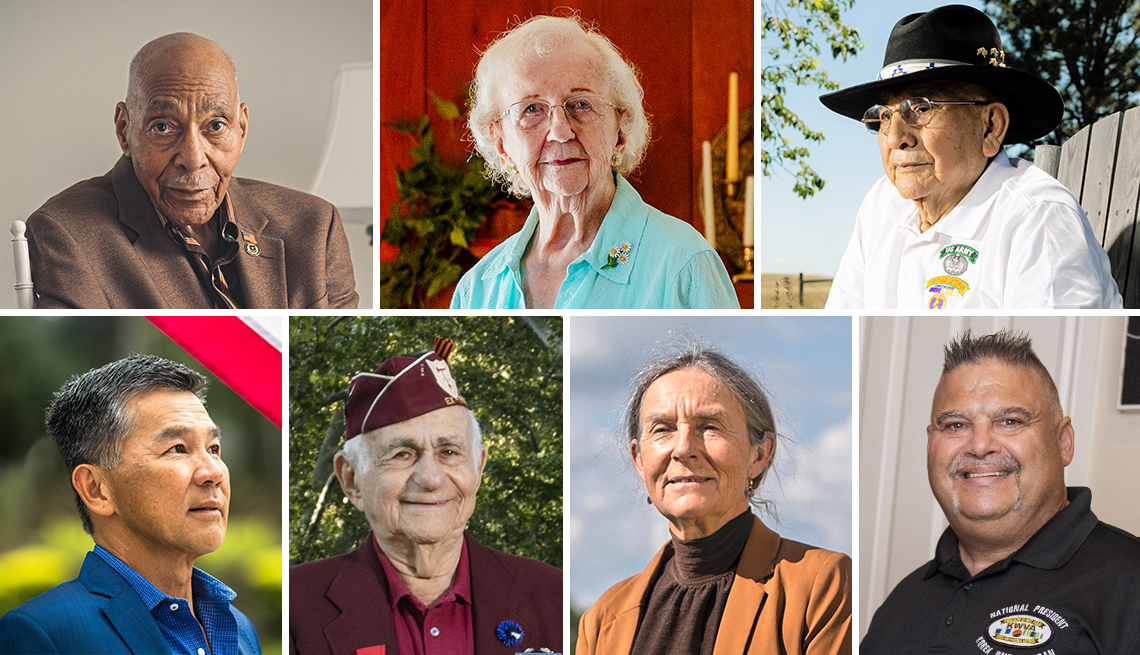
These Veterans Fought for Our Freedom
- Select a language for the TTS:
- UK English Female
- UK English Male
- US English Female
- US English Male
- Australian Female
- Australian Male
- Language selected: (auto detect) - EN
Play all audios:

_Sharrer, of Saginaw, Michigan, is the widow of an American officer who helped run a POW camp in Texas during World War II. _ I was in a school play in Detroit before the war. I was 16. My
girlfriend and I got on a bus one day. I was carrying my costume, and the bus lurched. There was a young man sitting there, and my tutu hit him in the face and he said: “Look out there,
redhead.” My girlfriend and I went to the back of the bus and sat down, and she said: “Well, he was sassy.” That’s how I met Bob (Robert Ross Sharrer). In December 1941, I was living with my
parents and working at Bell Telephone Company in Detroit as an operator. I was at the switchboard. It was a Sunday morning. Somebody said: “Pearl Harbor was bombed.” In February 1943, Bob
and I were married. Bob had been inducted into the Army and he arrived home on a Thursday night. On Friday, the two of us went to the store and ordered rings. On Saturday, I made my dress
and Bob cleaned my dad’s shoes and his dad’s shoes and his dad’s car. On Monday we went and got my ring, which had to be made smaller. We bought it as a size 4 and it had to be size 2½ to
fit. The jeweler asked, “Child bride?” And I said arrogantly, “No, I’m 19.” Bob went to Texas. He had to go into the hospital and was there when his unit shipped out and went overseas. The
army didn’t know what to do with this one leftover man. They said, “Well, let’s put him in a prisoner of war camp.” So they sent him to Camp Swift near Austin. He was put in charge of 3,000
German prisoners. “Welcome to America,” Bob would say when new prisoners arrived. “You did not start this war and neither did I. We are victims of war and we have some big decisions to
make.” I was there. I could hear the buzz of voices, and then Bob said: “I can swear at you. I can yell at you. Or I could treat you with respect — if you agree to treat me with respect and
obey my orders. If you agree, we can make this camp clean and peaceful. Everybody will be well fed. We might even enjoy some of our time. What do you think?” In unison, those kids would
raise their left arms in the air. They all hollered “ja.” One day, on a routine bed check, Bob found two young fellows with their beds turned upside down. One kid had made a paintbrush, and
then he had taken some toothpaste, colored some of it with beet juice and some of it yellow, and some he made green by using weeds. The kid was making a painting on the bottom of his army
cot. Bob said: “Oh, that is beautiful. How did you learn to paint?” The kid said his father and his grandfather were artists who had painted the crowned heads of Europe. The other kid was
hiding something, and Bob said: “Show me what you’ve got.” He had stolen a dull knife from the kitchen, and he had a stick and he was carving a dog. The next day, Bob sent me on an Army
Jeep, which was against the law — civilians were not supposed to ride on Army vehicles — into Austin. I bought paint, brushes, canvas, stretchers and a carving set. Those kids were so
thrilled to have something to do to hone their skills and to keep busy. They treated me like their big sister. I made shirts, blouses, aprons, pillowcases and clothes for their babies, so
they could send them to their families back in Germany. One day a general came along and stopped in front of me and asked, “What makes this camp peaceful?” I said, “Instead of telling you,
let me show you why this camp is peaceful.” I took him into the mess hall. Bob had given those kids the privilege to paint on the walls. They had painted life-size horses, cowboys wearing
American Stetson cowboy hats, Texas bluebonnets. On a table were carved horses and dogs. That general turned to me and said: “You bought them carving tools?” “Yes, sir.” “How many escaped
with carving tools?” “None of them. They do not want to escape. They are happy to be here. As long as they have to be prisoners in America, they prefer to be in this camp.” We were told that
after that, changes were made all across the country, in all POW camps. There were no more riots and no more murders. The young men were kept busy. Bob never shot anyone. Nobody ever shot
at him, but I think he absolutely helped to save some lives. I had my 99th birthday this year. I still drive my red Impala Super Sport around Saginaw, Michigan. Bob passed away in 2012. I
remember when our grandkids decided to give us a big party to celebrate our 60th anniversary. The pastor said, “Bob, shall we make plans to renew your vows?’ ” Bob said, “No.” And everybody
looked surprised. Then he said: “I meant it the first time. Why do you suppose it lasted 60 years?”
